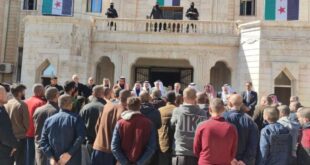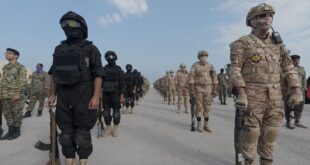UNITED NATIONS (Reuters) — Lebanon’s prime minister challenged Syria on Friday to mark borders between the two countries and establish diplomatic relations. But Syria said it was not ready to make such commitments.Prime Minister Fuad Siniora told the UN Security Council he had asked Secretary General Kofi Annan to “confirm the specific steps required by the UN to recognise Lebanese sovereignty” over the Shebaa Farms area.
The United Nations has said the Shebaa Farms are part of the Syrian Golan Heights, but that Lebanon and Syria could change the border themselves. They have not done so.
“We still await a positive response from Syria,” Siniora said in his first address to the 15-member council.
Syria’s deputy UN ambassador, Milad Atieh said Damascus would consider diplomatic relations with Beirut, but that “agreements and current institutions by far go beyond the question of exchange of ambassadors.” Lebanon and Syria have not had embassies on each other’s territory since Western powers carved the two states out of the remnants of the Ottoman Empire in 1920.
On Shebaa Farms, Syria’s Atieh said Israel first had to withdraw from land it has occupied since the 1967 war.
He said although his country agreed the territory was Lebanese, Syria was not willing to take up the issue yet.
“This can only occur after freeing this area from foreign occupation,” Atieh said.
At issue is a small strip occupied by Israel since the 1967 Middle East war. Maps studied by the United Nations show the area is part of Syria but Lebanon’s Hizbollah base their need for arms on defending it.
Syria, apparently reluctant to relinquish Shebaa, nevertheless supports Hizbollah’s contention that it must defend Lebanese territory against Israel.
The Security Council in September 2004 called for Syria to withdraw from Lebanon and for Lebanon to disarm militia so the Beirut government could control the entire country.
But Hizbollah, whose attacks helped end Israel’s 22-year occupation of southern Lebanon in 2000, has made no move to disband and join the Lebanese army.
Siniora said that reconciling Hizbollah’s armed existence and the government’s obligation “to have a monopoly over arms and to exercise its full authority throughout the country is a major challenge to be addressed in the period ahead.” Damascus, which entered Lebanon in 1976 to quell a civil war, pulled its troops out a year ago after the killing of former Lebanese prime minister Rafiq Hariri and 22 others.
Many have blamed Syria, which denies any responsibility for it.
The murders resulted in mass anti-Syrian demonstrations and were followed by more political killings.
Siniora, who belongs to the anti-Syrian coalition that now has a majority in parliament, said it was a “major challenge to put the Lebanese Syrian relations on the right footing.”
“The scars left by the dramatic developments of the past 19 months, and the heavy-handed interference in Lebanese domestic affairs by the Syrian security establishment for many years, are not easy to heal,” he said.
Asked about Iranian arms going to Hizbollah, Siniora did not respond. But he said there is a “strong relationship” between Hizbollah and Iran and stressed “we are very keen on maintaining very good relations with Iran.” The United Nations has sent a team to investigate the murder of Hariri. Siniora asked the council to extend the term of the prosecutor, Serge Brammertz, past its June 15 deadline.
Brammertz is on leave as deputy prosecutor of the International Criminal Court to serve as prosecutor.
 Eurasia Press & News
Eurasia Press & News



